John Adams was the second president of the United States of America, and was also one of our country’s founding fathers. Being in both the First and Second Continental Congresses and having important contributions to both, he was one of the key members in the shaping of our new country.
Young John Adams
John Adams was born in Braintree, a rural town in Massachusetts. Even though he would go on in life to hold a political career, he always considered himself a farmer at heart. Even as a child, he loved reading and enjoyed literature and words immensely. Beginning at a very young age, he kept a diary, a habit that he continued until he was too old to carry on.
John Adams was a hardworking man, though he could be very vain and more than once he was accused of being short-tempered—a flaw that he himself acknowledged as his vice. He frequently felt underappreciated by those around him and yearned for recognition for his accomplishments.
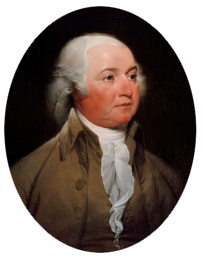
This portriat was painted by John Trumbull when Adams was Vice President in 1793.
He originally was going to be a pastor. His father, who believed that investing in and buying land were extremely important, sold land (the only time he would ever do that) to put his son through Harvard at sixteen years old, planning on his going to seminary.
John decided that he wasn’t interested and turned his attention to medical studies instead. By chance, he attended court one day and fell in love with the law. He studied law and got a job as a school teacher to help pay his way through.
One of his most notable cases as a young lawyer was representing the soldiers who opened fire on the civilians in what would become known as the Boston Massacre. He received quite a bit of notoriety and public criticism, but of the eight soldiers, six were acquitted and only two were found guilty of manslaughter, an impressive feat considering the public opinion. It was during this trial that he said the famous quote,
| “It is more important that innocence be protected than it is that guilt be punished, for guilt and crimes are so frequent in this world that they cannot all be punished. But if innocence itself is brought to the foo and condemned, perhaps to die, then the citizen will say, ‘whether I do good or whether I do evil is immaterial, for innocence itself is no protection,’ and if such an idea as that were to take hold in the mind of the citizen that would be the end of security whatsoever.” |
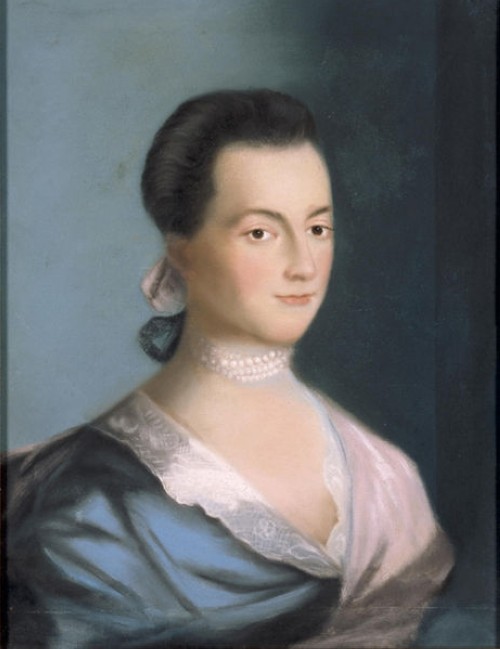
Abigail Adams by Benjamin Blythe in 1766
At 28 years old, he married Abigail Smith. He called her “best and wisest of friends,” and he valued her advice more than anyone else’s throughout his entire career. He spent so many years away from her as an ambassador to Europe, as a member of Congress, and in service to his country, that they wrote hundreds of letters to each other. These have given modern historians a lot of insight into his life.
The time before and during the Revolution was a time of words, and Adams did not disappoint. His Dissertation on the Canon and the Feudal Law, his first political work, went viral. His Thoughts on Government was originally a letter to another congressman, but when another requested a copy, and then another, he published it as a pamphlet.
Congressman
Adams is remembered for his unhesitating service. When he was asked to serve his country, he didn’t believe that refusing was an option. “This illustrious patriot has not his superior, scarcely his equal for abilities and virtue on the whole of the continent of America,” wrote Benjamin Rush of John Adams.
When he was chosen as a delegate to congress, he left his wife behind and traveled to Philadelphia. He was asked to head the Board of War for the burgeoning revolution, become a member of the Committee of Five, and was chosen to write the Declaration of Independence, among other positions on boards and committees.
John Adams is credited with nominating the Virginian George Washington as Commander-in-Chief. He was instrumental in arguing to get the Declaration of Independence passed. He debated for hours and hours in congress until he got it passed.
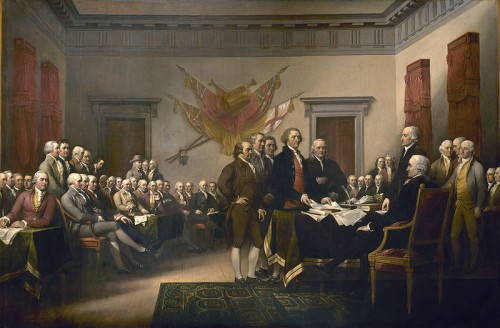
On seeing this painting, “Declaration of Independence”, by John Trumbull, elderly John Adams pointed to the door in the background and said, “When I nominated George Washington of Virginia for Commander-in Chief of the Continental Army, he took his hat and rushed out that door.” The painting depicts the entire Congress (though this scene, with all of Congress together in one room, never occurred) being presented with the newly written Declaration of Independence by the Committee of Five. John Adams is at center with his hand on his hip.
John Adams was an excellent judge of character. He loved observing people he saw and describing them in his journal. His character sketches of members of congress have been instrumental in helping us understand the men behind our freedom.
As well as recognizing the authority figure in the quiet George Washington, Adams claimed he was key in choosing Thomas Jefferson as the perfect author of the Declaration of Independence. In fact, he thought that Jefferson had done such a good job of it, that he fought hard to keep it in its original form and have no changes made to it. He was mistaken as its author for a while because he loved it so much that he copied it word for word into a letter home for his wife Abigail.
Diplomat
In 1777, Congress named Adams as a commissioner to work with Benjamin Franklin and Arthur Lee in negotiating a French alliance. Again, he kissed his wife goodbye and took his oldest son, John Quincy Adams, with him to France.
He deposited his son in a boarding school with Benjamin Franklin’s grandson, Benjamin Franklin Bache, whose newspaper caused a lot of trouble for Adams later in life. These years in France opened up the opportunity for John Quincy Adams to follow in his father’s footsteps as an ambassador and eventually become the sixth President of the United States as well.
“Every member of Congress in 1776 acknowledged him to be the first man in the House.”
~ Benjamin Rush writing of John Adams.
He had trouble getting along with Franklin. Perhaps it was simply that Franklin was aging, but Adams found him lazy and fond of fancy and expensive things (contrary to his public professions of preferring simplicity and frugality). Arthur Lee outright disliked Franklin and Adams found himself playing mediator between the two of them.
Adams worked hard to negotiate the French alliance and get them to agree to use their navy to help in the war, but he found that the French court was especially fond of Franklin and, feeling underappreciated by Congress, he left for home.
fooely a week after his return, he was chosen as a delegate to the state constitutional convention, where he was selected to write the Massachusetts constitution. His work is the oldest surviving working constitution in the world and was the model for many other state constitutions. He was naturally very proud of it.
“You cannot be, I know, nor do I wish to see you, an inactive spectator … We have too many high sounding words, and too few actions that correspond with them.”
~ Abigail Adams to John Adams
Congress unanimously voted Adams to go back to France, this time with a salary and his own secretary. He brought John Quincy with him again this time, as well as Charles, his second son.
On his way over, his ship sprung a leak and they had to stop in Spain for repairs where Adams decided to make the journey of 1,000 miles to Paris by land. This was a dangerous journey in the best of times, and it was in the dead of winter. Though some members of the traveling party got quite sick, they made it to France unharmed.
When negotiations with France became tense and the minister agreed to only work with Franklin, who had remained in France, Adams left for Holland in hopes of stirring sympathy there and procuring a loan for America. In order to give him the authority and position to communicate with the Dutch government, Congress appointed Adams as “minister plenipotentiary” to the Dutch Republic, the same position that Franklin was filling in France.
Circumstances were bleak in America. Britain seemed sure to win and no loan seemed forthcoming from France or from Amsterdam, where Adams had taken up residence, still without Abigail.
Franklin had written a letter to congress to say that Adams was causing trouble in French negotiations. France preferred Franklin’s laidback style of negotiating, which allowed them much freer reign, to Adams’ more aggressive and business-like manner. Both countries seemed to want America’s independence only for commercial gain, but wanted to arrange the peace treaties in such a way that left America’s commercial gain dependent on themselves. Adams began a campaign to win over the Dutch people by writing to their newspapers.
In a much-needed change of events, General Washington’s defeat of General Cornwallis in the Battle of Yorktown improved America’s odds in Europe. John Adams reminded the Dutch that they did not want to be on the losing side of this war and that they did not want to damage their commercial alliance with America.
There were certain procedures and laws for how diplomats could solicit money from other countries, but America was in such desperate straits that Adams ignored protocol. He deployed what he called “militia diplomacy” which disregarded the rules and asked outright for a loan. In spite of his incorrect proceedings, the Dutch people began to call for Adams’ promotion to American Ambassador. His campaign for their affections had been successful.
Finally, he secured a loan from a syndicate of three Dutch banking houses. It was not the 10 million that Congress had hoped for, but it was something, a beginning. By October of 1782, he had signed a Treaty of Commerce.
Hopes high, he traveled back to France to meet with John Jay. He had a little trouble working with Franklin after he heard about the letter he had written:
| That I have no friendship for Franklin I avow [i.e., affirm]. That I am incapable of having any with a man of his moral sentiments I avow. As far as fate shall compel me to sit with him in public affairs, I shall treat him with decency and perfect impartiality.~ John Adams(McCullough, John Adams, (Simon & Schuster, New York, 2001), p. 277). |
Adams took the letter as a personal betrayal, and his feelings were hurt easily, but he was capable of putting aside his feelings for his work, which he did now.
“He means well for his country, is always an honest man, often a wise one, but sometimes and in some things, absolutely out of his senses.”
~ Benjamin Franklin about John Adams
Franklin was following orders from Congress to allow the French to set the terms of their peace treaty. John Jay and John Adams felt that they should…
| … be honest and grateful to our allies, but to think for ourselves … obliging us to agree to whatever the French ministers should advise us to do, and to do nothing without their consent … I never supposed this to be the intention of Congress. If I had, I never would have accepted the commission. (ibid., p. 276) |
They refused to make negotiations with the British (which was a requirement of the French negotiations) unless their independence was recognized. Congress had ordered the men to acquiesce to the French request, but in favor of presenting a united front, they agreed to go against their orders, risk alienating the French, and to sit down with the British negotiators outside of French approval.
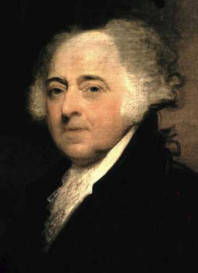
John Adams, by Gilbert Stuart
By November of 1782, John Jay, Benjamin Franklin, and John Adams had negotiated and signed a preliminary peace treaty with Britain outlining boundaries, fishing rights off the coast, and private debts to British merchants, among others. The British wanted compensation for the Loyalists who had been tortured, lynched, and whose lands and properties had been seized. Nothing on that score was ever decided, however, as none of the American negotiators had any sympathy for the Loyalists. It was more than Congress had hoped for and a very impressive piece of work.
As none of the articles of the preliminary treaty went against French interests, the French got over the incident. They were very impressed with the articles that Britain had agreed to.
And so the Treaty of Paris was signed and thus ended the American Revolution. The new country was born, nine years after the First Continental Congress and seven years after the signing of the Declaration of Independence. John Adams had been in Europe for three years.
When Congress asked Adams to stay longer and continue in England, Abigail and his daughter Nabby finally joined him. Thomas Jefferson joined Franklin and Adams, and they began the laborious process of drawing up commercial treaties with the countries of Europe.
When that task was complete, Adams was chosen to be America’s ambassador to England. America had severe debt which was slowing down communications with France and England.
Vice Presidency and Presidency
After a few years, his repeated request to come home was granted by Congress, and John Adams set to farming again. However, the life of politics would not leave him be, and he was elected by popular vote as vice president to George Washington—the very first vice president this country had ever had.
It took quite a bit of work to create an entirely new country, and the parameters of the position of vice president, or any position for that matter, was unclear and wound up defined by the first few people to hold that office. In Washington’s second term, Adams was voted again as the clear runner up, winning 27 more electoral votes than the next choice.
After Washington’s two terms were up, he was tired of the political battle and announced his retirement. Thomas Jefferson and John Adams were the top two candidates to run as president next. Though Adams was against splitting into political parties and didn’t want to be affiliated with either one, Jefferson was openly Democratic-Republican. Adams, as vice president to Washington, would be the Federalist candidate.
In spite of accusations of monarchist sympathies and pro-British leanings, John Adams won the election with Thomas Jefferson as his vice president, succeeding George Washington as President of the United States.
“It is universally admitted that Mr. Adams is a man of incorruptible integrity, and that the resources of his own mind are equal to the duties of his station,” wrote Benjamin Franklin Bache (Benjamin Franklin’s granson who had gone to boarding school with John Quincy in France) on Adams inauguration in the newspaper he owned (McCullough, op. cit., p. 470).
This praise was unusual as Bache frequently wrote ill of Adams, criticized his work as president, and ridiculed him in the newspapers, perhaps as a result of the less than perfect relationship Benjamin Franklin had with John Adams.
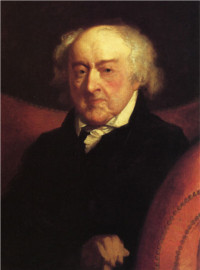
This portrait was painted by Gilbert Stuart at the request of John Quincy Adams. John Adams said having one’s portriat done was like doing penance, but he enjoyed sitting for Stuart.
Ignoring the political turmoil of rumors of a war with France on the horizon, Adams pushed through the growing faction between political parties, ignored the public slander from the Republican newspapers and even betrayal from his own cabinet.
This was a time when the newspapers were at war with each other and the newly born nation was threatening to collapse in on itself as it floundered in the after-effects of war. Many Americans believed that the breaking into political parties and the massive federal debt would cause a civil war, which the new nation would not survive.
His work—and his greatest accomplishment in his mind—was what avoided a war with France. He alone was responsible for sending the second peace mission to France.
The wildly unpopular Alien and Sedition Acts—which addressed the newspaper libel and the French and Irish immigrants who had taken up residence in the United States—were passed by Congress during his presidency, and though Adams wasn’t responsible for them, he, as president, took the brunt of the people’s anger. He pushed to make sure that Alexander Hamilton’s standing army and militia were disbanded, and he made sure that the United States had the beginnings of a navy before he left office, which turned out to be a necessity unforeseen by most.
When his term was up, he lost the election for presidency. This was mainly due to the advantage the Three-Fifths Compromise gave to Thomas Jefferson and a slanderous pamphlet published weeks before the election by Alexander Hamilton, who had been dabbling in politics since his term as Secretary of State. This created an irreparable rift in their already tenuous relationship.
It was a remarkably close election, especially considering the horrible press and the unpopularity of the Alien and Sedition Acts.
John Adams went home and settled back into farming, claiming to have lost all interest in politics, though his correspondence says otherwise. His friendship with Jefferson, though injured by their differing parties during their presidencies, was repaired, and they remained close friends. They died within hours of each other on July 4, 1826, the last two surviving signers of the Declaration of Independence, fifty years to the day after its signing.


